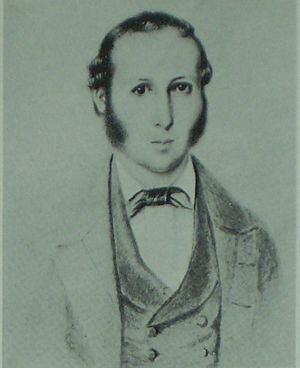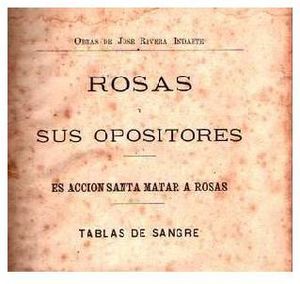José Rivera Indarte facts for kids
Quick facts for kids
José Rivera Indarte
|
|
|---|---|
 |
|
| Born | 1814 Córdoba, Argentina |
| Died | 1845 Santa Catarina, Brasil |
| Occupation | Journalist, poet |
| Language | Spanish |
| Nationality | |
José Rivera Indarte (born 1814 in Córdoba, Argentina – died 1845 in Santa Catarina, Brazil) was an Argentine writer. He was a poet and a journalist. He sometimes supported and sometimes criticized a powerful leader named Juan Manuel de Rosas. Rivera Indarte wrote a famous song called "Anthem of the Restorers" for Rosas. Later, he wrote a controversial document known as the "Blood tables."
Contents
Early Life and Writings
José Rivera Indarte studied in Buenos Aires, Argentina. There, he discovered his love for writing poetry.
Starting as a Journalist
Later, he moved to Montevideo, a city in Uruguay. In Montevideo, he started a newspaper called "El Investigador" (which means The Investigator).
Return to Buenos Aires
The President of Uruguay, Fructuoso Rivera, sent him back to Buenos Aires. This happened because a minister named Manuel Oribe asked for it. In Buenos Aires, Rivera Indarte joined a political group called the Federalist party.
Writing for Rosas
He wrote a poem that compared Juan Manuel de Rosas to an ear of corn. This was because Rosas had blond hair. A group that supported Rosas, called the Popular Restoring Society, even started using the name "Mazorca" (meaning "ear of corn") for themselves. Rivera Indarte also wrote a song for Rosas called the "Anthem of the Restorers." At that time, Rosas was known as the "Restorer of Laws."
Moving to Montevideo Again
In 1837, Rivera Indarte began to be watched by the Popular Restoring Society. Because of this, he decided to leave Argentina.
Time in Europe
He spent a few months traveling in Europe. After his time in Europe, he moved back to Montevideo, Uruguay.
Supporting Lavalle
In Montevideo, he supported a leader named Juan Lavalle. Rivera Indarte encouraged Lavalle to join forces with French armies. These armies were fighting against the Argentine Confederation at that time.
A Dangerous Plot
In 1841, there was a dangerous plot against Rosas. Someone sent him a gift that secretly contained a complex weapon. This weapon was designed to fire in many directions when opened. Luckily, the weapon did not work. Rivera Indarte was accused of being involved in this plot.
The Blood Tables
In 1843, a French company hired Rivera Indarte for a special task. They wanted him to write a report about people who had died in Argentina under Rosas's government. This report became known as the Blood tables.
How the List Was Made
The agreement said that Rivera Indarte would get paid a small amount for each death he listed. The list included many types of deaths:
- People who died in battles fought by the Unitarian group.
- Soldiers who were shot during wartime for things like mutiny or spying.
- Victims of regular crimes.
- Even some people who were still alive were accidentally listed.
- He also listed "NN" deaths, which means unidentified people.
- Some names were even repeated more than once.
- Rivera Indarte also blamed Rosas for the death of Facundo Quiroga, another important figure.
Payment for the Report
Rivera Indarte listed 480 deaths in his report. For this work, he was paid two Pound sterling. This amount would be worth about U$S 8,400 today. He tried to add many more names to the list, about 22,560 in total. These were deaths from military conflicts in Argentina between 1829 and that time. However, the French company refused to pay him for these extra names.
José Rivera Indarte passed away in Brazil in 1845.
See also
 In Spanish: José Rivera Indarte para niños
In Spanish: José Rivera Indarte para niños
 | Claudette Colvin |
 | Myrlie Evers-Williams |
 | Alberta Odell Jones |


